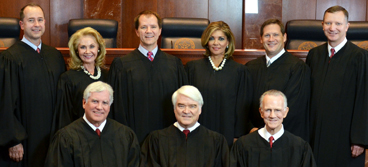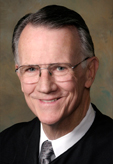© 2015 The Texas Lawbook.
By Janet Elliott
AUSTIN (July 6) – The Texas Supreme Court, using the state constitution and a case involving eyebrow threaders, expanded the rights of Texans to be free of “unreasonably burdensome” economic regulations.
In adopting a new standard of review for measuring business regulations, lawyers involved in the case say the court delivered a ruling to match the state’s vaunted reputation as a frontier of economic freedom.

“With this decision, Texas has cemented its reputation as a beacon for entrepreneurship and innovation,” says Wesley Hottot, who represents the threaders. “The whole state will reap the rewards.”
Hottot, an attorney with the Institute for Justice in Bellevue, Wash., said the ruling goes far beyond those who earn a living by wielding a cotton thread to remove eyebrow and facial hair.
“This decision is a landmark victory not just for eyebrow threaders, but for economic liberty in the Lone Star State,” says Hottot. “Texans are now more secure in their right to support themselves and their family, free from unreasonable government interference.”
On June 26, the court ruled 6-3 that requiring threaders to have an esthetician or cosmetology license is unreasonably burdensome and oppressive in relation to the underlying governmental interest. A strongly worded dissent accused the majority of inventing an unprecedented new test and ushering in an era of government by judges.
Hottot says the majority “announced its departure from federal cases, under which economic liberty is treated like a second-class right, and adopted a unique Texas test for reviewing economic regulations.”
Timothy Sandefur, a principal attorney for the Pacific Legal Foundation, which filed an amicus brief supporting the threaders, says he hopes the ruling serves as an inspiration for courts in other states to develop their own constitutional protections greater than those adopted by federal courts.
“If there is any state that is going to stand out as being willing to take an independent road in protecting freedom, it should be Texas, which has such a political tradition of being independent from the rest of the states,” says Sandefur.
Charles W. “Rocky” Rhodes, whose teaches constitutional law at South Texas College of Law, filed a neutral brief in the case, says the heightened scrutiny announced by the court is a momentous decision that might influence the jurisprudence in other states. But he also worries the test could prove difficult to apply in future cases.
“As the dissenters point out, the difficulty with such a malleable test is that it may sow additional confusion and invite unpredictable judicial decision-making,” says Rhodes. “It is difficult to surmise what other economic regulations might be invalidated.”
Threading Without a License
The case began in 2008 when the Texas Department of Licensing and Regulation issued notices of alleged violations to two threaders working in a mall kiosk without licenses. In 2009 the plaintiffs sued the department, seeking declaratory judgment that the cosmetology statutes and associated regulations violated their constitutional right “to earn an honest living in the occupation of one’s choice free from unreasonable governmental interference.”
Lead plaintiff Ashish Patel, along with other threaders and owners of threading businesses, argued that the state required them to get a license that requires 750 hours of training even though basic sanitation education was the only information relevant to their activities. However, the plaintiffs’ own expert testified that threading, done in unsanitary conditions, could lead to the spread of highly contagious bacterial and viral infections.
The state argued that the suit was a claim that department officers exceeded their authority and should be barred by sovereign immunity. The trial court ruled that the department and its governing commission did not have immunity but granted summary judgment for the state on the merits.
The 3rd Court of Appeals in Austin found that the regulation was constitutional as applied to the threaders.
The majority opinion by Justice Phil Johnson traces the due course of law language in Article 1, Section 19 of the Texas Constitution and compares it with the federal due process clause. Johnson noted that the drafting and adopting of the 1875 state constitution was accomplished shortly after the U.S. Supreme Court decision in the Slaughter-House Cases involving butchers who challenged a Louisiana statute that granted a single slaughter house a monopoly in New Orleans. The court rejected the butchers’ claims, concluding that the federal constitution protected only privileges and immunities created by the federal government.

“That burden has been recognized in various decisions of Texas courts for over one hundred and twenty-five years,” Johnson said. “We continue to do so today” in adopting a review standard that looks at “whether the statute’s effect as a whole is so unreasonably burdensome that it becomes oppressive in relation to the underlying governmental interest.”
Johnson was joined in his opinion by Justices Paul Green, Don Willett, Debra Lehrmann and John Devine in remanding the case to the trial court. Justice Jeffrey Boyd concurred in the judgment but did not agree with the adoption of a new alternative test.
Justice Willett filed a lively, lengthy concurrence and argued that judges should conduct a search for truth. “I believe the Texas Constitution requires an earnest search for truth, not the turn-a-blind-eye approach that prevails under the federal Constitution,” said Willett, who was joined by Justices Lehrmann and Devine.
Texas Assistant Solicitor General Dustin Howell, who represented the state, declined comment on the ruling.
Lochner ‘Monster’ Revived
Chief Justice Nathan Hecht wrote the dissenting opinion, which was joined by Justices Eva Guzman and Jeff Brown. He accused the majority of
inventing “a new test unprecedented in American jurisprudence” and ushering in “a new era of government by judges.”
Hecht liked the majority’s ruling to the U.S. Supreme Court’s “own adventure with substantive due process beginning with Lochner v. New York.”
That 1905 case struck down a law regulating the number of hours that bakers could work, finding that it had no direct relation to employee health. Legal experts say the Lochner era ended with the 1938 ruling in United States v. Carolene Products Co., when the high court said regulatory legislation affecting ordinary commercial transactions was presumed to be constitutional absent evidence that no rational basis existed for the regulation.
“The Lochner monster, rediscovered and unleashed by the Court, will stray far from the Judiciary’s proper sphere of authority – and to places far afield of the economic realm to which the Court is sympathetic,” said Hecht. “Judicial usurpation of authority over the State’s policies may provide protection for economic liberties on which the concurrence waxes eloquent, but it also gives rise to such decisions as Roe v. Wade.”
Hecht said the court should stick with the rational basis test.
“Oppression is very much in the eye of the beholder,” said Hecht. “In this case, the Court takes into account the amount, cost, and apparent usefulness of the required training, a threader’s lost income-earning opportunity, and the danger to public health and safety. I suppose the Court would agree that it should also take into account the number and severity of incidents of harm due to poor training and the benefit to threaders and the public.”
He continued: “This process is what is generally referred to as legislating. It should be done. It should not be done by judges.”
In a separate dissent, Justice Guzman also accused the majority of legislating from the bench.
The Texas Legislature, in its recently concluded session, considered but did not pass legislation to de-regulate threading.
The Pacific Legal Foundation’s Sandefur says he hopes courts are returning to Lochner. He is such a fan of the case that his vehicle license plate bears its citation.
“The generation of lawyers and judges who were taught that Lochner was bad, they need to rethink things. Lochner said the government may not arbitrarily deprive you of the right to earn a living,” says Sandefur. “I have no objection to that at all.”
© 2015 The Texas Lawbook. Content of The Texas Lawbook is controlled and protected by specific licensing agreements with our subscribers and under federal copyright laws. Any distribution of this content without the consent of The Texas Lawbook is prohibited.
If you see any inaccuracy in any article in The Texas Lawbook, please contact us. Our goal is content that is 100% true and accurate. Thank you.
